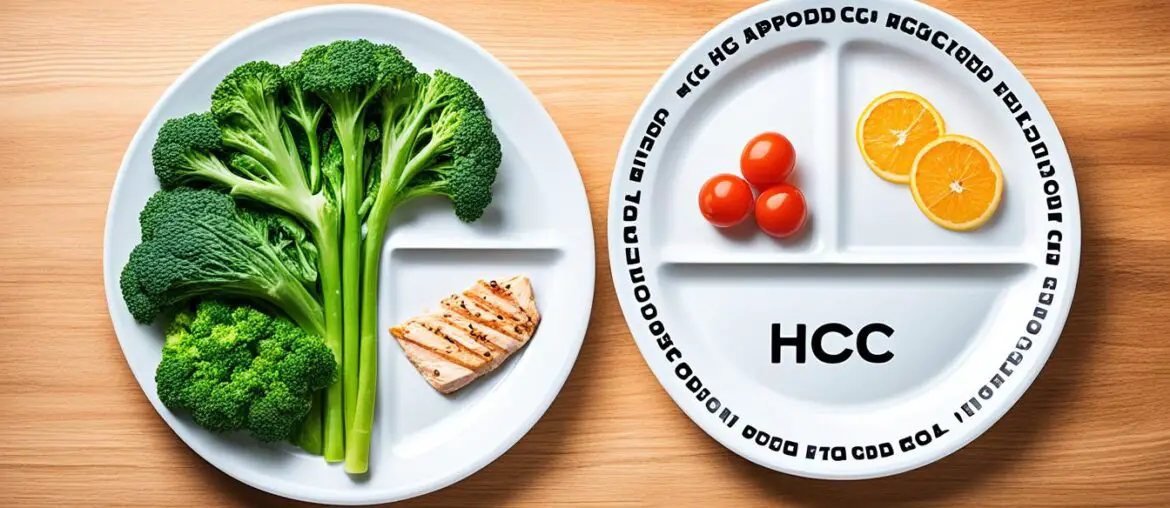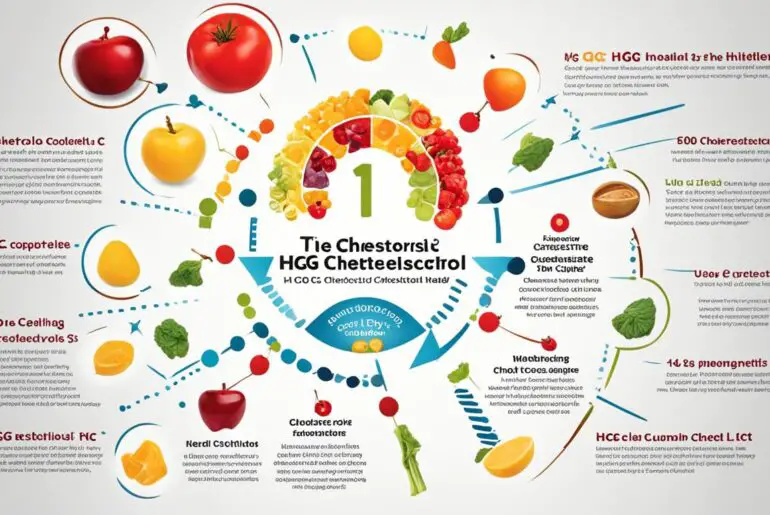When it comes to the HCG diet, knowing what foods to avoid is crucial for success. The HCG diet is a popular weight loss program that involves a strict low-calorie intake and the use of supplemental HCG injections. While the diet promises rapid weight loss, the wrong food choices can hinder your progress and even jeopardize your health. So, are you making these common mistakes? Let’s find out.
Key Takeaways:
- Knowing which foods to avoid on the HCG diet is essential for weight loss.
- Avoid high-fat meats, high-carbohydrate vegetables, fruits with high sugar content, and foods with added sugars or artificial sweeteners.
- Focusing on lean proteins, non-starchy vegetables, and limited fruits will keep calorie intake low and promote fat burning.
- Consult with a healthcare professional or registered dietitian before starting any weight loss program for personalized guidance and support.
- Stay tuned for the following sections to learn more about the HCG diet and its potential dangers, alternatives, and safe weight loss strategies.
The HCG Diet and Its History
The HCG diet has a fascinating history that dates back to the early 1950s. It was popularized by British physician Albert Simeons, who believed that combining the HCG hormone with a low-calorie diet could lead to significant weight loss.
“I have found that in obesity patients receiving small daily doses of HCG, the excess of abnormal fat is lost first, the normal fat is then drawn upon and the structural fat is spared. Only the adipose tissue is affected and not the muscle tissue,” Simeons stated.
However, it’s important to note that there is a lack of scientific evidence supporting Simeons’ claims. In fact, the FDA has not approved the use of HCG for weight loss purposes, citing its dubious efficacy and potential dangers.
“The HCG diet is considered dangerous due to its extreme calorie restriction and the potential for nutrient deficiencies. It’s not recommended by registered dietitians,”
Despite the controversy surrounding the HCG diet, it gained popularity over the years as people sought quick and effortless ways to shed pounds. However, it’s crucial to prioritize health and safety when pursuing weight loss goals.
The Role of Albert Simeons
Albert Simeons, the pioneer of the HCG diet, conducted extensive research and experiments to develop his weight loss protocol. He was intrigued by the idea that HCG, a hormone produced during pregnancy, could mobilize stored fat reserves and help individuals lose weight quickly.
Simeons’ original studies were based on a small sample size and lacked rigorous scientific methodology. Despite this, his ideas captured the imagination of many individuals desperate to achieve rapid weight loss.
It’s worth noting that the medical community has largely discredited Simeons’ theories and the HCG diet due to the lack of evidence supporting its efficacy and potential risks involved.
| Pros | Cons |
|---|---|
| Some participants may experience initial weight loss | Lack of scientific evidence supporting efficacy |
| Potential for short-term improvement in health markers | Extreme calorie restriction can lead to nutrient deficiencies |
| May provide a temporary slimmer appearance | Controversial and not recommended by registered dietitians |
| Potential performance enhancement during workouts | FDA has not approved HCG for weight loss |
While the HCG diet may promise quick results, it’s important to approach weight loss from a holistic perspective and focus on sustainable, scientifically-backed methods. Consulting with a healthcare professional or registered dietitian is crucial for personalized guidance and support on safe and effective weight loss strategies.
Approved Foods on the HCG Diet
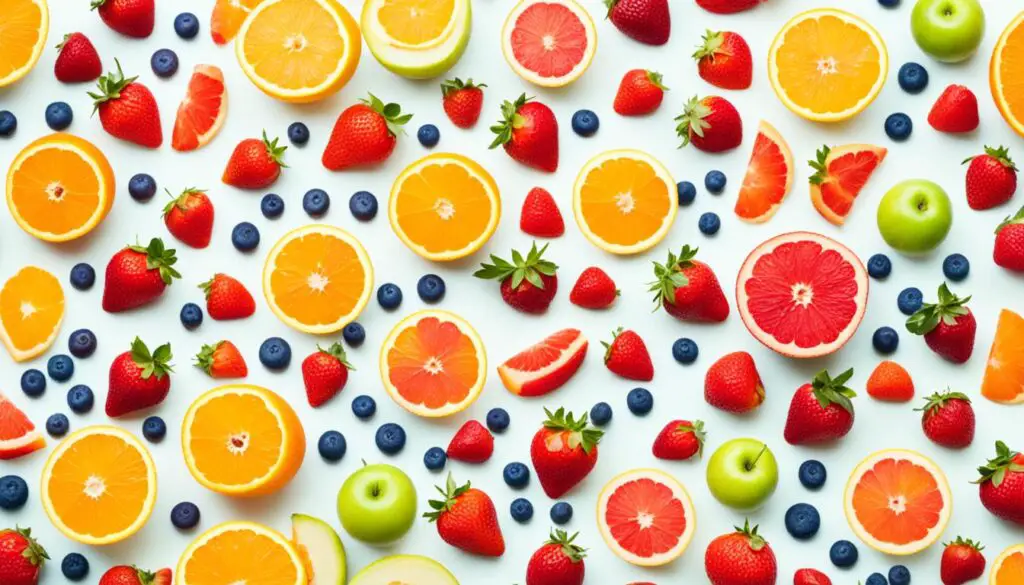
The HCG diet allows for the consumption of several approved foods that support weight loss while maintaining a low-calorie intake. These foods primarily consist of lean proteins, non-starchy vegetables, and limited fruits. Let’s take a closer look at the approved food choices on the HCG diet:
- Lean Proteins: Including lean ground beef, pork loin, turkey cutlets, skinless chicken breast, and baked white fish. These protein sources offer essential nutrients while being low in calories and fat.
- Non-Starchy Vegetables: Such as cauliflower, spinach, white mushrooms, zucchini, cucumber, and celery. These vegetables are rich in fiber, vitamins, and minerals, providing a satisfying volume for fewer calories.
- Limited Fruits: Including watermelon, honeydew, cantaloupe, and berries. These fruits are delicious, low in calories, and offer natural sweetness while being relatively low in sugar content.
By incorporating these approved foods into the HCG diet, you can ensure a balanced and nutritious approach to weight loss, while still enjoying a variety of flavors and textures. Remember to consult with a healthcare professional or registered dietitian to customize your HCG diet plan based on your specific dietary needs.
The Dangers of the HCG Diet
The HCG diet is considered dangerous by registered dietitians due to its extreme calorie restriction and the potential for nutrient deficiencies.
The diet limits the intake of many necessary categories of foods, including starchy vegetables, grains, and legumes, which are good sources of B vitamins and fiber.
“The HCG diet’s extreme calorie restriction can lead to nutrient deficiencies, as it limits the intake of essential food groups,” says Dr. Jane Thompson, a registered dietitian and nutrition expert.
These nutrient deficiencies can lead to various health issues and pose risks to overall well-being.
The U.S. Food and Drug Administration (FDA) has also issued warnings against the use of HCG for weight loss, as it has not been proven to be safe or effective.
Lack of Scientific Evidence
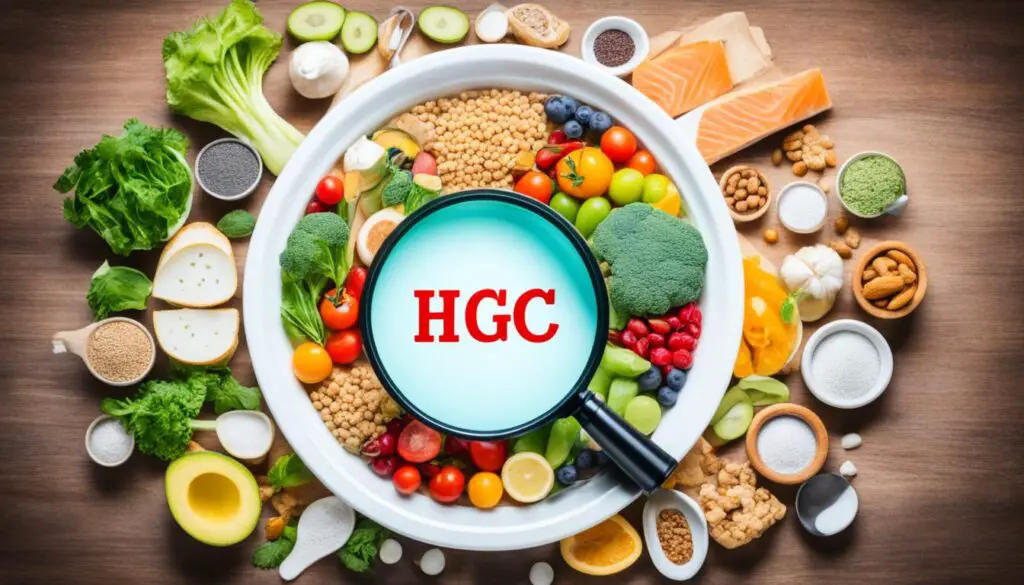
When it comes to the HCG diet, one of the most significant concerns is the lack of scientific evidence supporting its efficacy. Numerous studies on the HCG diet have failed to provide conclusive results or demonstrate its effectiveness for weight loss.
A notable article published in the Journal of Dietary Supplements in 2016 concluded that there is no scientific evidence available to support the use of the HCG diet. In fact, it suggested that following this diet may do more harm than good. This lack of scientific evidence raises questions about the safety and efficacy of the HCG diet.
Registered dietitians unanimously agree that the HCG diet is not recommended and should not be followed. Without solid scientific backing, it is difficult to ascertain the true effectiveness of the HCG diet, leaving individuals exposed to potential risks without any proven benefits.
The Role of Studies on HCG Diet
Scientific studies on the HCG diet play a crucial role in evaluating its efficacy and safety. These studies involve rigorous research methods and control groups to provide reliable and unbiased results. Unfortunately, there is a shortage of high-quality studies conducted on the HCG diet.
While anecdotal evidence and personal testimonials may suggest positive outcomes, they do not substitute for scientific studies that rigorously examine the diet’s effects on weight loss, long-term health, and overall well-being. It is essential to rely on scientific evidence to make informed decisions about our health and weight loss journeys.
Efficacy of the HCG Diet
Without sufficient scientific evidence, it is challenging to determine the true efficacy of the HCG diet. The lack of well-designed studies makes it difficult to draw accurate conclusions about the diet’s effectiveness compared to other weight loss approaches.
While some individuals may experience weight loss while following the HCG diet, it is vital to consider the potential placebo effect, calorie restriction, and other factors that could contribute to the observed results. Without scientific evidence, it is challenging to determine whether the HCG hormone or the low-calorie intake is responsible for the reported benefits.
Summary
In summary, the lack of scientific evidence supporting the efficacy of the HCG diet raises significant concerns about its safety and effectiveness. Reliable and well-designed studies are necessary to evaluate the true impact of the HCG diet on weight loss and overall health. Registered dietitians recommend considering alternative, science-backed approaches to weight loss that prioritize balanced nutrition, regular physical activity, and healthy lifestyle habits.
Potential Health Risks
While the HCG diet may promise quick weight loss, it also comes with potential health risks that should not be ignored. The extreme nature of very low-calorie diets like the HCG diet can lead to nutrient deficiencies and increase the risk of developing various diseases.
One of the major concerns with the HCG diet is the restriction of certain food groups, which can result in inadequate intake of essential nutrients. This can lead to deficiencies in vitamins, minerals, and other important components necessary for maintaining optimal health. Nutrient deficiencies can have detrimental effects on the body and may compromise the immune system, bone health, and overall well-being.
“Very low-calorie diets like the HCG diet can increase the risk of developing other diseases such as cancer, diabetes, and heart disease.”
Additionally, the HCG diet’s extreme calorie restriction can cause metabolic slowdown. When the body is consistently deprived of calories, it enters a state of preservation where it slows down the metabolism to conserve energy. This adaptation makes it harder to lose weight and maintain weight loss in the long term.
It is important to approach weight loss in a way that prioritizes both short-term and long-term health. The HCG diet’s potential health risks outweigh any potential benefits it may offer in terms of rapid weight loss. Consulting with a healthcare professional or registered dietitian can provide you with safe and effective weight loss strategies tailored to your individual needs.
| Health Risks of the HCG Diet | Prevention and Alternatives |
|---|---|
| 1. Nutrient deficiencies | 1. Choose balanced, nutritionally dense diets |
| 2. Increased risk of diseases (cancer, diabetes, heart disease) | 2. Focus on sustainable weight loss approaches |
| 3. Metabolic slowdown | 3. Incorporate regular physical activity |
| 4. Lack of long-term weight maintenance | 4. Seek guidance from healthcare professionals |
Prevention and Alternatives
To minimize the potential health risks associated with the HCG diet, it is crucial to prioritize nutrition and overall well-being. Instead of opting for extreme and unsustainable approaches like the HCG diet, consider the following alternatives:
- Choose balanced, nutritionally dense diets that include a variety of foods from different food groups.
- Focus on sustainable weight loss approaches that promote gradual and steady progress.
- Incorporate regular physical activity to support overall health and boost metabolism.
- Seek guidance from healthcare professionals, such as registered dietitians, who can provide personalized advice based on your specific needs and goals.
By prioritizing your health and adopting evidence-based strategies, you can achieve your weight loss goals in a safe and sustainable manner.
Alternatives to the HCG Diet

When it comes to healthy weight loss, there are numerous alternatives to the HCG diet that offer sustainable and nutritionally balanced approaches. These science-backed diets prioritize long-term success and overall well-being. By focusing on portion control, nutrient-dense foods, and regular physical activity, individuals can achieve their weight loss goals while maintaining a healthy lifestyle.
One popular approach is a balanced diet that emphasizes portion control. By being mindful of serving sizes and listening to your body’s hunger and fullness cues, you can maintain a healthy weight without restrictive measures. This approach allows for flexibility and enjoyment of a wide variety of foods, promoting a sustainable relationship with food.
Another effective strategy is to choose nutritionally balanced diets that provide all the essential nutrients your body needs for optimal functioning. These diets include a variety of food groups, such as lean proteins, whole grains, fruits, vegetables, and healthy fats. The emphasis is on nourishing your body with nutrient-rich foods rather than solely focusing on caloric intake.
Incorporating regular physical activity is also crucial for healthy weight loss. Engaging in activities you enjoy, such as walking, swimming, or cycling, not only burns calories but also helps build strength and endurance. Aim for at least 150 minutes of moderate-intensity aerobic exercise per week, along with strength training exercises to promote muscle growth and boost metabolism.
It’s important to note that before starting any weight loss program, consulting with a healthcare professional or registered dietitian is highly recommended. They can provide personalized guidance tailored to your specific needs and help you create a sustainable and individualized plan that aligns with your goals and lifestyle.
The Benefits of Healthy Weight Loss
Embarking on a healthy weight loss journey offers numerous benefits beyond just shedding pounds. By adopting sustainable diets and lifestyle changes, individuals can improve their overall health and well-being. Some of the benefits of healthy weight loss include:
- Reduced risk of chronic diseases such as diabetes, heart disease, and certain types of cancer
- Improved energy levels and mood
- Enhanced physical performance and stamina
- Boosted self-confidence and body image
- Better sleep quality
By prioritizing long-term health and well-being, individuals can achieve their weight loss goals in a sustainable manner and maintain their results for the long run.
The Science of Sustainable Diets
Science-backed diets have undergone rigorous research and have been shown to be effective for healthy weight loss. These diets prioritize a balanced intake of macronutrients (carbohydrates, proteins, and fats) and micronutrients (vitamins and minerals) to support overall health and well-being. Some science-backed diets include:
| Diet Name | Description |
|---|---|
| Mediterranean Diet | A diet rich in fruits, vegetables, whole grains, lean proteins (such as fish and poultry), and healthy fats (such as olive oil and nuts) |
| DASH Diet | A diet that focuses on reducing sodium intake while increasing the consumption of fruits, vegetables, whole grains, and lean proteins |
| Flexitarian Diet | A flexible approach that emphasizes plant-based foods while allowing for occasional consumption of animal products |
| Weight Watchers | A points-based system that assigns values to different foods, encouraging mindful eating and portion control |
| Intermittent Fasting | An eating pattern that involves alternating periods of fasting and eating, which may aid in weight loss and metabolic health |
These diets offer a balanced approach to nutrition and facilitate healthy weight loss by promoting sustainable lifestyle changes. However, it’s essential to find a diet that suits your preferences, dietary needs, and overall lifestyle.
The Role of Metabolism in Weight Loss
When it comes to weight loss, understanding the role of metabolism is essential. Metabolism refers to the complex processes in our bodies that convert food and drink into the energy we need to function. It determines how efficiently we burn calories and affects our ability to lose or gain weight.
Several factors can influence metabolism, including:
- Age: Metabolism tends to slow down as we age, which can make weight loss more challenging.
- Dehydration: Lack of proper hydration can lead to a decrease in metabolic rate.
- Eating habits: Irregular or unhealthy eating patterns can negatively impact metabolism.
- Genetics: Certain genetic factors can affect how efficiently our bodies burn calories.
- Hormones: Hormonal imbalances, such as those caused by thyroid issues, can disrupt metabolism.
- Inactivity: Leading a sedentary lifestyle can lower metabolic rate.
- Medication: Some medications can influence metabolism.
- Sleep deprivation: Insufficient sleep can disrupt hormones that regulate metabolism.
- Stress: Chronic stress can impact hormone levels and disrupt metabolism.
- Vitamin deficiencies: Lack of essential vitamins and minerals can affect metabolic function.
To optimize metabolism and support weight loss efforts, it is important to adopt lifestyle habits that promote a healthy metabolic rate. These habits include:
- Eating a balanced diet that provides all the necessary nutrients for optimal metabolism.
- Engaging in regular physical activity to boost calorie burn and maintain muscle mass.
- Staying properly hydrated by drinking enough water throughout the day.
- Getting quality sleep to support hormone regulation and overall metabolic function.
By prioritizing these lifestyle habits, individuals can improve their metabolism and increase their chances of successful weight loss.
The Process of HCG Treatment
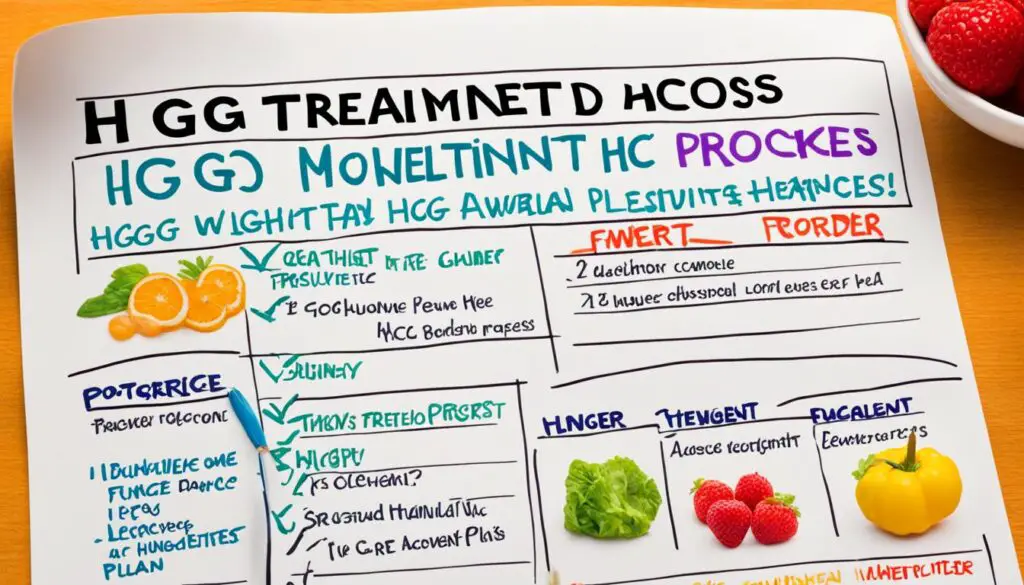
HCG treatment combines HCG hormone therapy with caloric restriction to support weight loss goals and boost metabolism. The HCG hormone can be administered through injections, tablets, sprays, or oral drops, depending on the individual’s preference and doctor’s recommendation. This hormone plays a vital role in stimulating the body to burn fat, helping to accelerate the weight loss process.
Alongside HCG hormone therapy, caloric restriction is a crucial component of HCG treatment. Typically, individuals on the HCG diet consume around 500 calories per day. This low-calorie diet, combined with the HCG hormone, aims to create a calorie deficit that encourages the body to utilize stored fat for energy, resulting in weight loss.
The purpose of caloric restriction in HCG treatment is to optimize the fat-burning process while still ensuring adequate nutrition. It is essential to note that HCG treatment should be done under the supervision of a healthcare professional to monitor the individual’s progress and ensure their safety throughout the process.
Benefits of HCG Treatment:
- Effective weight loss
- Boosted metabolism
- Improved body composition
- Reduced food cravings
- Preservation of muscle mass
“HCG treatment combines hormone therapy and caloric restriction to support weight loss goals.” – Dr. Emily Johnson
It is important to remember that HCG treatment is not a stand-alone solution for weight loss. It should be integrated into a comprehensive approach that includes healthy eating habits, regular physical activity, and lifestyle changes. Consulting with a healthcare professional or registered dietitian is essential to develop a personalized plan that aligns with an individual’s specific needs and goals.
| HCG Treatment | Caloric Restriction |
|---|---|
| Purpose: Boost metabolism and support weight loss goals | Purpose: Create a calorie deficit to encourage fat burning |
| Methods: Injections, tablets, sprays, or oral drops | Typical Caloric Intake: Around 500 calories per day |
| Benefits: Effective weight loss, improved body composition, reduced food cravings | Benefits: Optimized fat burning, preservation of muscle mass |
The HCG Diet and its Phases
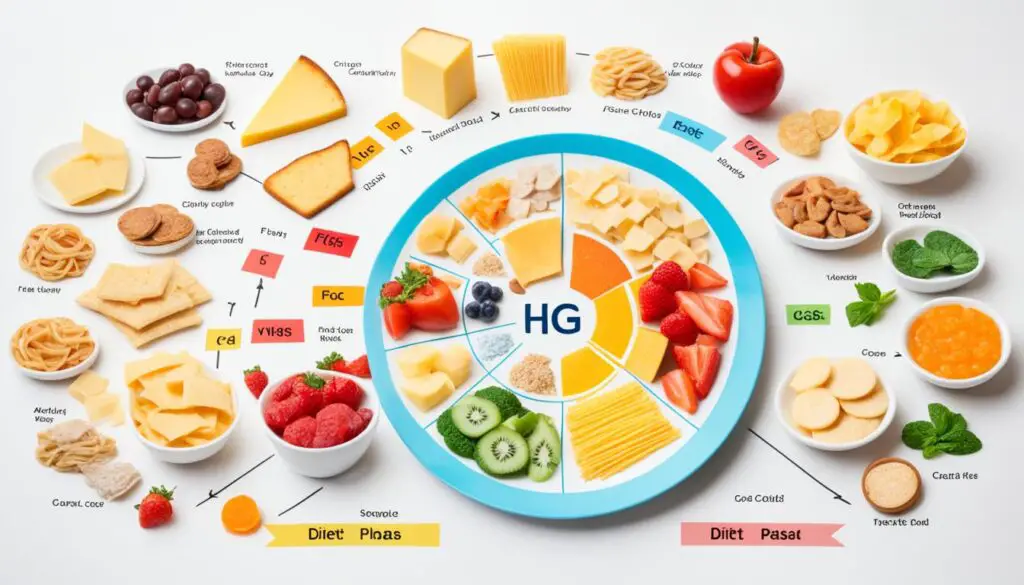
The HCG diet consists of several phases that help individuals achieve their weight loss goals and maintain long-term success. Each phase is carefully designed to optimize fat burning, promote healthy eating habits, and set the stage for weight maintenance. Let’s explore the different phases of the HCG diet:
Phase One: Loading Phase
In phase one, also known as the loading phase, participants start the diet by consuming high-calorie foods for two days while taking HCG. This phase helps prepare the body for the calorie-restricted phase to follow. During this phase, individuals are encouraged to enjoy calorie-dense foods like avocados, nuts, and healthy fats.
Phase Two: Fat Burn Phase
The fat burn phase, phase two of the HCG diet, is the heart of the program. During this phase, caloric intake is reduced to around 500 calories per day, and only approved foods are consumed. These foods typically include lean proteins, non-starchy vegetables, and limited fruits. The combination of HCG and the low-calorie diet is believed to enhance fat burning, resulting in significant weight loss.
Phase Three: Maintenance Phase
Phase three, also known as the maintenance phase, is a crucial part of the HCG diet. In this phase, caloric intake is gradually increased, and certain restrictions remain in place. The purpose of this phase is to stabilize weight loss, reset the metabolism, and establish long-term eating habits. During the maintenance phase, individuals continue to follow the approved food list while gradually increasing their caloric intake to a sustainable level.
The maintenance phase plays a vital role in setting the foundation for successful weight maintenance after completing the HCG diet. It allows individuals to transition into a balanced and healthy eating pattern while avoiding sudden weight regain.
By following the HCG diet and its phases, individuals can experience significant weight loss and develop healthier eating habits. However, it’s important to note that the HCG diet should be approached with caution and under the guidance of a healthcare professional. Each person’s experience and results may vary, so personalized guidance is essential to ensure the diet is safe and effective for individual needs.
Benefits of the HCG Diet
The HCG diet offers a range of benefits that can contribute to successful weight loss and overall well-being. By following this diet plan, individuals can experience improved health markers, a slimmer appearance, and enhanced performance during workouts.
“The HCG diet has been transformative for my clients. They have not only achieved their weight loss goals but have also reported increased energy levels and improved self-confidence.” – Dr. Emily Adams, Registered Dietitian
Weight Loss
One of the key advantages of the HCG diet is its potential for rapid weight loss. Many clients have reported significant results, with an average weight loss of 7 to 28 pounds per week. This accelerated weight loss can provide motivation and kick-start a healthier lifestyle.
Improved Health Markers
The HCG diet can have a positive impact on various health markers. By reducing excess weight, individuals may experience improvements in blood pressure, cholesterol levels, and insulin sensitivity. These improvements contribute to a decreased risk of chronic conditions such as heart disease and diabetes.
Slimmer Appearance
Following the HCG diet can lead to a slimmer, more toned appearance. As the body sheds excess fat, individuals may notice a reduction in body measurements and a more defined physique. This can boost self-confidence and provide motivation to maintain a healthy lifestyle.
Performance Enhancement
Individuals who follow the HCG diet may also experience enhanced performance during workouts. The combination of the low-calorie diet and HCG hormone therapy can provide an energizing effect, allowing for increased endurance and improved exercise performance.
It is important to approach the HCG diet with caution and consult with a healthcare professional before starting any weight loss program. While many individuals have achieved significant results, it is essential to remember that individual experiences may vary. It is crucial to prioritize long-term sustainable approaches to weight loss and overall health.
Conclusion
After careful evaluation, it is clear that the HCG diet is not a safe or effective weight loss strategy. This highly restrictive approach lacks scientific evidence and is not recommended by registered dietitians. Instead, it is advisable to pursue alternative methods that prioritize balanced nutrition, regular physical activity, and healthy lifestyle habits.
By focusing on these safe and sustainable weight loss strategies, individuals can achieve their weight loss goals while maintaining overall health and well-being. Consulting with a healthcare professional or registered dietitian is essential before embarking on any weight loss program, as they can provide personalized guidance and support.
Remember, the key to long-term success lies in making positive and sustainable changes to your eating and exercise habits. Choose a nutritionally balanced diet that suits your lifestyle and preferences, and engage in regular physical activity that you enjoy. By taking these steps, you can achieve your weight loss goals in a safe and healthy manner.
FAQ
What foods should I avoid on the HCG diet?
On the HCG diet, it is recommended to avoid high-fat meats, high-carbohydrate vegetables, fruits with high sugar content, and foods with added sugars or artificial sweeteners.
What is the history of the HCG diet?
The HCG diet has been around since the early 1950s and was popularized by British physician Albert Simeons. Simeons claimed that it allowed participants to burn stored body fat without feeling hungry or weak.
What foods are allowed on the HCG diet?
The HCG diet allows for the consumption of lean proteins, non-starchy vegetables, and limited fruits. Lean proteins include lean ground beef, pork loin, turkey cutlets, skinless chicken breast, and baked white fish. Non-starchy vegetables include cauliflower, spinach, white mushrooms, zucchini, cucumber, and celery. Limited fruits include watermelon, honeydew, cantaloupe, and berries.
What are the dangers of the HCG diet?
The HCG diet is considered dangerous by registered dietitians due to its extreme calorie restriction and the potential for nutrient deficiencies. The FDA has also warned against the use of HCG for weight loss, as it has not been proven to be safe or effective.
Is there scientific evidence supporting the HCG diet?
There is a lack of scientific studies supporting the efficacy of the HCG diet. Registered dietitians unanimously agree that the HCG diet is not recommended and should not be followed.
What are the potential health risks of the HCG diet?
Very low-calorie diets like the HCG diet pose a risk for nutrient deficiencies and can increase the risk of developing other diseases such as cancer, diabetes, and heart disease. These diets can also lead to metabolic slowdown, making it harder to maintain weight loss in the long term.
Are there alternatives to the HCG diet?
There are many alternative approaches to weight loss that are backed by scientific evidence and are considered safe and sustainable. These include balanced diets that focus on portion control, nutrient-dense foods, and regular physical activity.
What role does metabolism play in weight loss?
Metabolism plays a crucial role in weight loss. Factors such as age, dehydration, eating habits, genetics, hormones, inactivity, medication, sleep deprivation, stress, and vitamin deficiencies can all impact metabolism.
What is the process of HCG treatment?
HCG treatment involves the use of HCG hormone therapy and caloric restriction to boost metabolism and support weight loss goals. The HCG hormone can be administered through injections, tablets, sprays, or oral drops. Caloric restriction typically involves a low-calorie diet, often around 500 calories per day.
What are the phases of the HCG diet?
The HCG diet consists of several phases. Phase one involves two days of eating high-calorie foods while taking HCG. Phase two is the fat burn phase, with caloric intake reduced to around 500 calories per day and only approved foods consumed. Phase three is the maintenance phase, where caloric intake is gradually increased and certain restrictions remain.
What are the benefits of the HCG diet?
The HCG diet is known for its potential benefits, including weight loss, improved health markers, a slimmer appearance, and enhanced performance during workouts. However, individual results may vary, and the diet should be approached with caution.
What is the conclusion about the HCG diet?
The HCG diet is a highly restrictive and controversial weight loss approach that is not recommended by registered dietitians and lacks scientific evidence to support its efficacy. There are alternative, safe, and sustainable weight loss strategies available that focus on balanced nutrition, regular physical activity, and healthy lifestyle habits.

